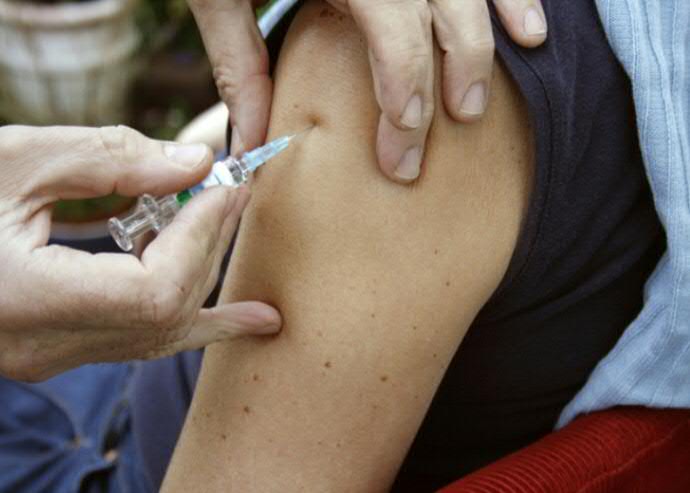Effectieve vaccins vallen tussen wal en schip

Nederland maakt geen gebruik van verschillende vaccins die zowel medisch werkzaam als kosten-effectief zijn. Zij vallen buiten het Rijksvaccinatie programma voor kinderen, maar passen ook niet in het Geneesmiddelen Vergoedingen Systeem dat beschikbaarheid van medicijnen via huisarts en apotheker regelt. Dit stelt de Groningse hoogleraar Farmaco-economie Maarten Postma.
Postma praatte onlangs in Den Haag de Tweede Kamer woordvoerders Gezondheidszorg bij over vaccins die nu nog tussen wal en schip vallen. Vrijdag 29 mei vindt in het UMCG een symposium plaats over dit thema, ter gelegenheid van twee promoties uit de groep van Postma op die dag. Op dit symposium zal ook een vertegenwoordiger van de Wereldgezondheidsorganisatie WHO spreken.
Twee concrete voorbeelden
Twee concrete gevallen maken het probleem duidelijk, stelt Postma. Het HPV-vaccin (gericht tegen het humaan papiloma virus dat baarmoederhalskanker kan veroorzaken) is nu alleen (gratis) beschikbaar voor meisjes van 12 jaar, via het Rijksvaccinatie programma (RVP). ‘Maar onderzoek laat zien dat het ook kosteneffectief is om het vaccin aan te bieden aan tieners en jonge vrouwen tot en met 24 jaar’, vertelt Postma. Maar zij vallen niet onder het RVP.
De kosteneffectiviteit volgt uit een afweging van de kosten van een vaccinatieprogramma tegen de besparingen aan medische zorg die de preventie van de ziekte (in dit geval baarmoederhalskanker) oplevert. Daarnaast wordt bepaald hoeveel winst in levensjaren er is, gecorrigeerd voor een goede kwaliteit van leven. Uiteindelijk levert dat een schatting op van de kosten per gewonnen levensjaar in goede gezondheid, de ‘QALY’ (quality adjusted life years).
Het aanbieden van HPV vaccinatie aan meisjes van 16 jaar kost minder dan €20.000 per QALY, voor vrouwen tot en met 24 jaar ligt het bedrag onder de €50.000 en soms onder de €20.000. Een bedrag beneden de €50.000 per QALY wordt meestal gezien als kosteneffectief. Toch werd geen vergoeding van HPV vaccinatie voor oudere meisjes en jonge vrouwen verleend door VWS en de toetsingscommissie voor het GVS. Postma: ‘Deels komt dit doordat de gehanteerde criteria zijn opgesteld voor geneesmiddelen en niet voor vaccins.’
Vergelijkbare situatie
Een vergelijkbare situatie doet zich voor bij het vaccin tegen het rotavirus. Dit virus kan hoge koorts veroorzaken bij zuigelingen. De infectie is bijna nooit dodelijk, maar kan wel voor een ingrijpende ziekenhuisopname van jonge kinderen zorgen. Het vaccineren van alle baby’s kost circa €3000 per QALY. ‘Maar het RVP richt zich vooral op preventie van sterfte, en die is bij het rotavirus al zeer laag. Daardoor voldoet het vaccin niet aan de criteria’, stelt Postma.
Nederland laat gezondheidswinst liggen
Door het niet vergoeden van kosteneffectieve vaccins laat Nederland gezondheidswinst liggen, blijkt uit vergelijking met de ons omringende landen. ‘Afwijzingen van effectieve vaccins ontstaan vooral omdat ze niet passen binnen het RVP of het GVS. Daarom is er een meer integraal beoordelingskader nodig dat beter rekening houdt met de totale gezondheidswinst van een vaccin en de bijbehorende kosten-effectiviteit’, aldus Postma. Op dit moment werkt de Gezondheidsraad aan zo’n nieuw beoordelingskader.
De onderzoeksgroep van Postma is de enige in Nederland die zich geheel richt op de kosteneffectiviteit van geneesmiddelen, met name vaccins. De twee promoties van vrijdag betreffen een analyse van de kosteneffectiviteit van het vaccineren van baby’s tegen het rotavirus in België en een aantal verdere landen, en het gebruik van nieuwe economische perspectieven bij berekening van kosteneffectiviteit.
Meer informatie
- Voor meer informatie, neem contact op met Prof. Maarten Postma.
- Er zijn nog enkele plaatsen beschikbaar bij het symposium van 29 mei, dat van 9.30 tot 11.30 uur plaatsvindt in het UMCG gebouw 3216, zaalnummer 0062. Geïnteresseerden kunnen zich aanmelden via j.schoonveld rug.nl .
Meer nieuws
-
26 februari 2026
Vici-beurs voor hoogleraar Neurologie Marieke Wermer
-
17 februari 2026
De lange zoektocht naar nieuwe fysica
